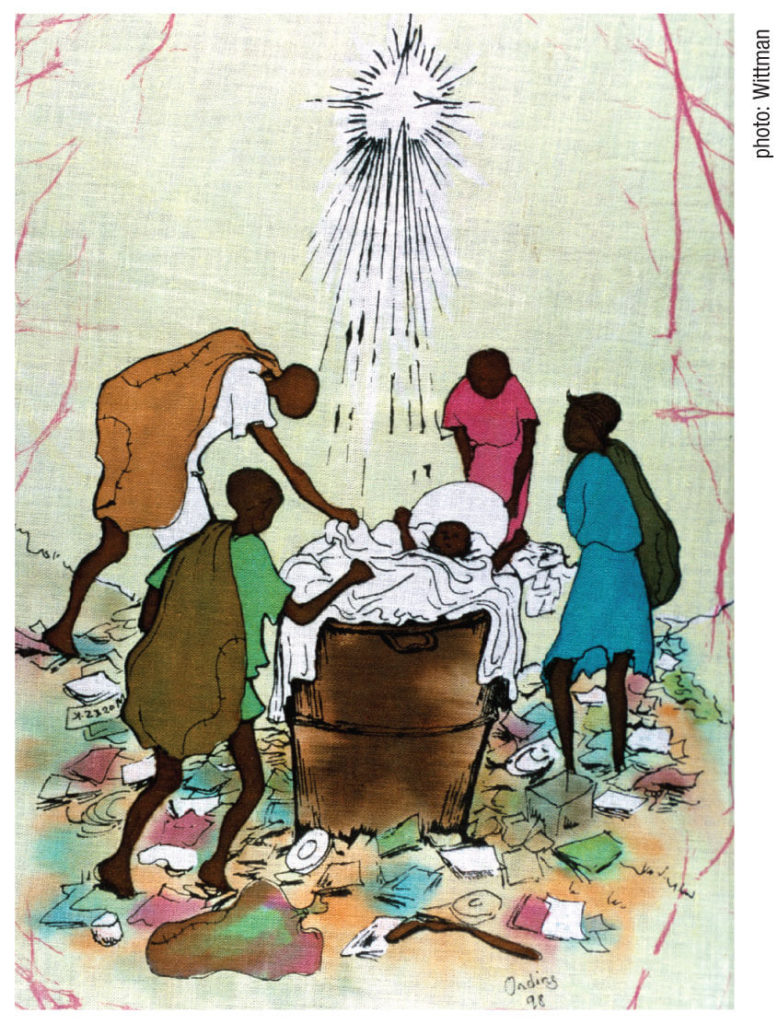
Matthew’s nativity narrative does not focus on Jesus’ actual birth. Who Jesus is concerns this evangelist more than how Jesus was born.
For this reason Matthew opens his gospel by tracing Jesus’ genealogy from Abraham, the founding father of God’s chosen people, through King David to Joseph, Mary’s espoused husband. An angel instructs Joseph in a dream to name the child Jesus, which means God’s salvation. This child is Emmanuel, God-with-us, who fulfills Isaiah’s ancient prophecy (7.14).
But Jesus is not only the leader/savior God promised the chosen people. Jesus has come also for the rest of humankind. That is the meaning of the main Christmas story in Matthew’s gospel, the visit of the magi. Jesus is not only king of the Jews, but the hope of the Gentiles, all the non-Jewish peoples of the earth — us.
Only Matthew tells of the wise visitors from the East. The story introduces a major theme of his gospel: The inclusion of the Gentiles in the promises of Jesus.
- Name Gentile peoples of the earth from whom group members descend. What do you know about how your people first journeyed to faith in Jesus?
The word magi has the same root as the word magic. It was used of people thought to have more than human knowledge. In his story, Matthew characterizes the magi as students of the stars, interpreters of dreams, and worshipful seekers of the new messiah. Their wisdom manifests itself in several ways:
• They identify a particular star and choose to follow it.
• When lost (husbands, please note), they ask directions from credible sources.
• They discern the identity of the child and pay him homage.
• They heed the dream warning and do not return to Herod.
Most remarkably, the magi are not distracted or deterred by the fact that the messiah they seek is not one of their people, nor they of his.
This would have been a critical point for early readers of Matthew. In the 50 years between Jesus’ death and resurrection and the gospel’s writing, Gentile believers had come to outnumber Jewish Christians in Matthew’s community. This was a source of tension as well as creative ferment.
Jews and Gentiles had to tolerate and, where possible, integrate their different traditions, forms of worship, and ways of understanding Jesus. To sustain the unity of their diverse community, they had to recognize that the good news and saving grace Jesus brought was for all of them. Both groups had an equal claim to him as their ruler and shepherd.
Matthew’s Christmas story affirms this: Jesus is the Jewish messiah and people who are not Jewish are eager and welcome to honor and follow him. Who you are or where you are from is irrelevant.
As Paul writes to the Ephesians, “In Christ Jesus the Gentiles are now co-heirs with Jews, members of the same body and sharers of the promise through the preaching of the gospel” (3.6).
- How would Matthew respond to anti-Semitism today?
- What insight and guidance does the Epiphany story offer regarding tensions among Christians, Muslims, and Jews today?
The tensions that early Christians felt and dealt with remain with us in our faith communities and in the world at large. Exclusiveness is a natural human inclination. We want to belong. Life is easier with people who are like us, who think the way we think, and do things the way we do. Welcoming strangers challenges us to take first steps we feel unsure how to make so we miss out on widening our experience.
When it gets down to the nitty-gritty of food, water, clothing, shelter, jobs, and other vital necessities, the drive to “take care of our own” grows even stronger. The notion that “we all do better, when we all do better” is attractive until there’s not enough to go around.
But there is no mistaking the message of the Epiphany readings: God is inclusive and wants us to be so in matters of faith and worship and in managing the goods of this world. Jew or Gentile, Christian or Muslim, native or alien, black, brown, yellow, red or white, male or female, straight or gay — whoever we are and wherever we are from — we are all invited and welcome to visit the child of Bethlehem and to hear and receive the good news of peace and forgiveness and reconciliation that he brings.
“Lord, every nation on earth will adore you,” sings Sunday’s responsorial psalm. It continues, “For God shall save the poor when they cry and the needy who are helpless. God will have pity on the weak and save the lives of the poor.” That’s our work, too, by the grace of God.
- What have you learned from people of other religions about what they value about Jesus?
- What experience have you had of working with people of other religions on common causes?
- How can we in our parish faith community become more inclusive of people from other nations and cultures? How can we better help people who are poor and needy?
